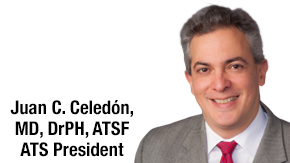In the last four months, the COVID-19 pandemic has disproportionately affected Black, Latinx, and Native  American communities, further exposing longstanding health disparities in the United States. On a global level, outcomes have varied by country and, as in the U.S., within distinct population groups.
American communities, further exposing longstanding health disparities in the United States. On a global level, outcomes have varied by country and, as in the U.S., within distinct population groups.
In 2014, the ATS defined respiratory heath disparities as “significant differences in respiratory health that are closely linked to racial ancestry, social, economic, and/or environmental differences.” Such disparities adversely affect groups of people who have experienced greater obstacles to health based on characteristics historically linked to discrimination or exclusion, such as race or ethnicity, gender, and socioeconomic status.
When people think of health disparities, they focus on limited access to health care (a major problem in the U.S.), but such disparities go far beyond access to medical care. In fact, “upstream factors” such as structural (e.g., policies and racism) and social (e.g., education and housing) determinants of health ultimately explain unequal exposure to risk factors across demographic groups. Indeed, ATS members often encounter health disparities because the major risk factors for respiratory diseases (e.g., tobacco use, air pollution, obesity, infections, and hazardous occupations) vary by demographic groups. This is often accompanied by inequities in screening and prevention efforts, which worsen health disparities in respiratory diseases. It is only after a respiratory disease develops that disparities in morbidity or mortality result from unequal access to health care.
Respiratory health equality, the attainment of the highest level of respiratory health for all people, is both an ideal and the founding purpose of the American Thoracic Society. The ATS Health Equality and Diversity Committee evaluates our progress toward achieving this goal and provide recommendations to the ATS leadership as to how our society can continue to move forward in this critical area. The committee’s initiatives include promoting more diverse representation in our society and our profession, advocating for government policies and research funding that address health disparities, and publishing related documents (including an upcoming perspective on COVID-19 disparities).
The ATS (alone and in partnership with our peer societies) supports “environmental justice” through national and international advocacy for comprehensive antismoking efforts, the right of all people to breathe clean air, and a safe and healthy working environment. Moreover, the ATS vigorously advocates for a diverse workforce and universal access to health care in the U.S. Research and educating the public, two major ATS priorities, are key to eliminating health disparities. To further these efforts, the ATS and the CHEST Foundation recently teamed up to create a Research Grant in Diversity, focused on diseases that affect under-represented minorities in the U.S., and to develop publicly available low-literacy materials on COVID-19 in English and Spanish (https://formylunghealth.com/). Moreover, the ATS plans to offer a new research grant in diversity later this year.
Eliminating respiratory health disparities is not a goal to be accomplished by the ATS alone, as it will require efforts by multiple stakeholders, including governmental and public health agencies, professional societies, educational and health care institutions, the private sector, and patient and community organizations. Yet, in the words of Franklin D. Roosevelt, “the test of our progress is not whether we add more to the abundance of those who have much but rather whether we provide enough for those who have little”. As a key stakeholder, the ATS will continue to tirelessly work and push to guarantee a better future for all our patients.

